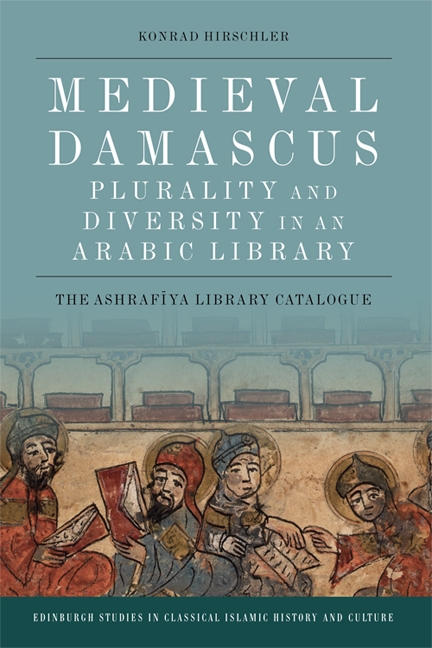Book contents
- Frontmatter
- Contents
- List of Illustrations
- Acknowledgements
- Introduction
- 1 The Making and Unmaking of a Medieval Library
- 2 Organising the Library: The Books on the Shelves
- 3 Plurality and Diversity: The Profile of a Medieval Library
- 4 The Ashrafīya Catalogue: Translation and Title Identification
- 5 The Ashrafīya Catalogue: Edition
- Bibliography
- Index of Subjects
- Index of Titles
- Index of Authors
- Index of External Categories
3 - Plurality and Diversity: The Profile of a Medieval Library
Published online by Cambridge University Press: 05 August 2016
- Frontmatter
- Contents
- List of Illustrations
- Acknowledgements
- Introduction
- 1 The Making and Unmaking of a Medieval Library
- 2 Organising the Library: The Books on the Shelves
- 3 Plurality and Diversity: The Profile of a Medieval Library
- 4 The Ashrafīya Catalogue: Translation and Title Identification
- 5 The Ashrafīya Catalogue: Edition
- Bibliography
- Index of Subjects
- Index of Titles
- Index of Authors
- Index of External Categories
Summary
We have seen who put the books on the Ashrafīya's shelves and how these books were organised; the present chapter will now turn to the books themselves. The Ashrafīya catalogue provides the first opportunity for scholarship to access and gain an insight into the thematic profile of a large-scale medieval Arabic educational library and this discussion centres on just that: what kind of texts were available and what the library's thematic profile tells us about its function within the literary topography of a medieval Middle Eastern city. Until now scholarship has not recognised the originality and breadth of the collection and its potential contribution to understanding medieval libraries and this is for two main reasons: the Ashrafīya's eponym has had a rather ‘anti-intellectual’ reputation in modern scholarship, so without this catalogue the library's diet of books would have been assumed to be rather meagre. Yet, as will be seen in the following, a rather colourful mixture of books surrounded al-Malik al-Ashraf in his final resting place. More important for Middle Eastern history beyond the case of this one specific ruler and his intellectual outlook is that the library was part of a run-of- the- mill mausoleum-cum- madrasa, which scholarship has not considered to have had particularly interesting book collections.
Al-Malik al-Ashraf's reputation in modern scholarship – not that there is much of a reputation – has been dented by his dismissal of the leading theologian and theoretical jurisprudent Sayf al-Dīn al-Āmidī. Louis Pouzet considered this as a pivotal moment of ‘the “traditionalist” and anti-intellectual reaction, which accompanied the accession [of al-Malik al-Ashraf]’ in Damascus. In a similar vein, Stephen Humphreys argued that al-Malik al-Ashraf did not share the ‘tolerance’ of his brother and predecessor al-Mucazzam, but that he rather pursued a ‘constant policy to rid his capital of rationalist philosophizing in its madrasas and of “extremist” Sufis in its popular life’. In consequence, ‘his patronage extended only to the narrowest form of scholarship, the study of hadith’ in line with ‘the strict and puritanical tone of his public administration’.
- Type
- Chapter
- Information
- Medieval Damascus: Plurality and Diversity in an Arabic LibraryThe Ashrafiya Library Catalogue, pp. 102 - 132Publisher: Edinburgh University PressPrint publication year: 2016



